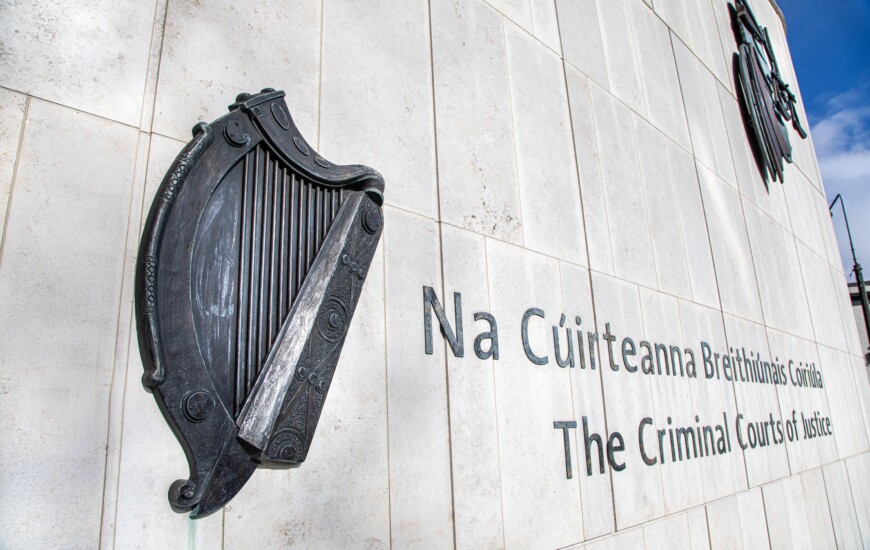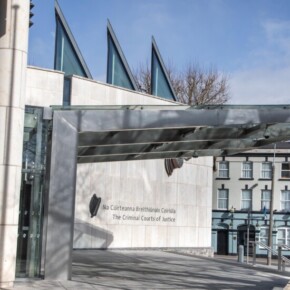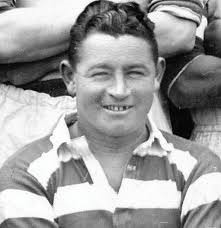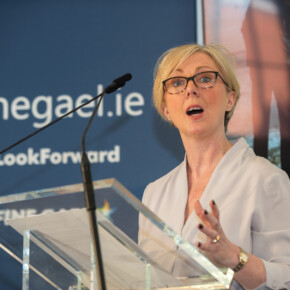Firm to be sentenced later after a man fell down a 24-metre ventilation shaft and died
Gary Ibbotson 15 Jun 2023
By Jessica Magee
The family of a man who died after falling 24 metres down a ventilation shaft has said his death could have been prevented, if workplace health and safety measures had been in place.
John McCann (62) fell to his death through an inadequately signed fragile surface on the sixth-floor of Ove Arup and Partners Ireland Ltd, Ringsend Road, Dublin 4 on September 23, 2019.
The engineering consultancy firm is due to be sentenced in two weeks’ time at Dublin Circuit Criminal Court, after a company representative pleaded guilty to two breaches of the Safety, Health and Welfare at Work Act, 2005.
Mr McCann, from Greenfort Gardens, Clondalkin and formerly from Stratford-on-Slaney, Co Wicklow, had been subcontracted to supervise the installation of fibre optic cabling on the day.
In a statement, Mr McCann’s family said the pain and hurt of losing their father was “just unbearable” and expressed the hope that no one else would lose their life or suffer the pain they are going through. “It breaks our heart how you died,” the statement read.
At a hearing today/yesterday today/yesterday (WEDNESDAY), a Health and Safety Authority (HSA) inspector criticised Ove Arup’s “laissez-faire approach” to health and safety and said the company had failed to follow through on risk assessment.
Ove Arup previously pleaded guilty to failing to ensure the safety of non-employees at a place of work on the day in question.
Andrew Harrison, on behalf of the company, further admitted failing to ensure the provision and maintenance of health, safety and welfare at work, specifically with regard to the fragile floor surface of the plant room.
HSA Inspector Kevin Broderick told Caroline Latham BL, prosecuting, that Ove Arup Global had sanctioned the worldwide upgrade of its fibre optic telecommunications system.
Mr Broderick said Mr McCann was a cabler employed by Total Splicing Solutions and had been supervising a three-man crew on the day.
The crew were to install cabling from basement level up to the plant room on the sixth floor and began by verifying the route of the existing telecommunications system through vertical ‘risers’.
When on the sixth floor, the cabling crew, accompanied by an Ove Arup team lead, went through a security door and past a considerable amount of ducting to where a yellow, lightweight barrier was in place.
The floor surface looked like a concrete floor but was not in fact load-bearing, comprising instead of a fire-resistant substance mixed with a small amount of mortar, the court heard.
Mr McCann stepped onto a ventilation shaft covered with this lightweight fire insulation material which gave way, causing him to plunge 24 metres to the basement level.
Mr Broderick said that not only was the surface inadequate for fire resistance purposes, but that there was no visual indication of the fragility of the floor and the lightweight barrier was not fixed and easily movable.
The court heard there were two laminated printed A4 sheets in the room saying “do not enter” but without indicating where or why.
A colleague of Mr McCann’s said he heard a scream and felt a gentle touch against his leg as the victim fell, before they began running from floor to floor trying to locate him in the riser.
Paramedics were called and broke into the shaft at ground level after identifying the outline of Mr McCann in the shaft base.
Fire brigade members also attended to Mr McCann and noted that he was unresponsive and had no pulse.
A post mortem concluded that Mr McCann had died from multiple head, spinal and chest acute traumatic injuries consistent with a fall from a great height.
The HSA interviewed 35 people and established that although concerns had been raised about the fragility of the floor surface 13 months earlier, these had not been communicated to general management who were subsequently “blindsided” by Mr McCann’s tragic death.
“It was a laissez-faire approach to health and safety, with inadequate signage, a failure to follow through on risk assessment and a lack of communication between departments and levels of management,” said Mr Broderick.
He also criticised the company’s inadequate permit system, which he said was “exacerbated by the direct knowledge of the hazard by competent people”.
Mr Broderick said the floor should have been painted a different colour or marked with a grid pattern to inform people that there was a fragile surface. He said the ‘Do not enter’ signs were inadequate.
The court heard that the fragility issue was on people’s radars, experts had been consulted and solutions had been discussed, including putting in a robust fixed barrier to restrict access – but that these solutions had not been prioritised or progressed.
“There were loads of procedures there – just they weren’t implemented,” said Mr Broderick.
Counsel for Ove Arup and Partners, Remy Farrell SC, said the company has no previous convictions and accepted its responsibility for Mr McCann’s death.
Mr Farrell apologised to the McCann family on behalf of the company and said the breach in safety standards had not been deliberate.
The court heard that the civil proceedings in the case have been dealt with and that the company wants to make a donation in the region of €40,000 to a charity supported by the late Mr McCann, the Clondalkin Eviction Support Group.
Mr McCann’s widow, his seven children and his brothers were all present in court and had submitted victim impact statements.
In the statement, the family said their world had fallen apart the day their Dad, husband and grandad was taken from them and that words could not describe their sadness, hurt and pain.
They said the family suffered anxiety, depression and constant daily sadness, worrying about if their brothers or partners will come home if they go to work.
“To think your death could have been prevented if health and safety had been in place. Hopefully, no other person will lose their life or family members suffer the pain we are going through every time we think of how you died,” the statement read.
“We will never get over this pain and the big hole you have left in our hearts,” they said.
The court heard that the maximum penalty that can be imposed is a fine of €3 million.
Judge Orla Crowe expressed the condolences of the court to Mr McCann’s family and adjourned finalisation of the sentence to June 26.











